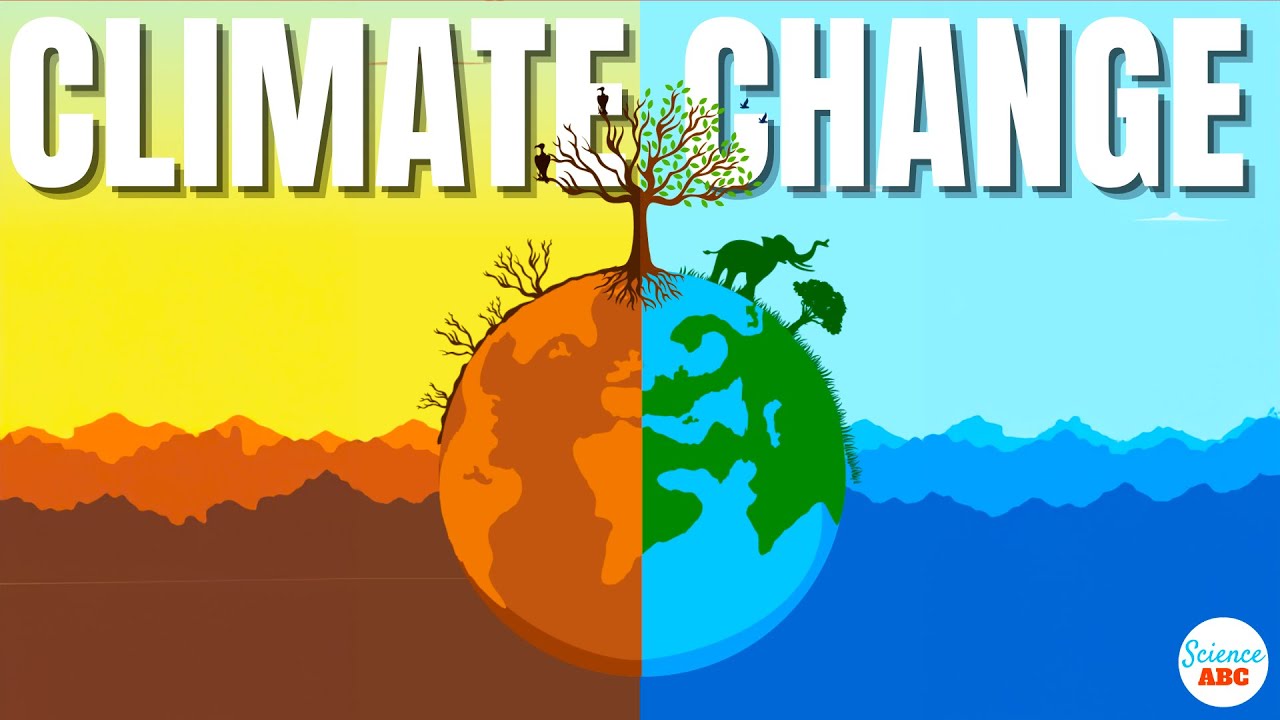Climate Change 101 with Bill Nye | National Geographic
Summary
TLDRClimate change, a critical and real issue, is characterized by a rapid increase in Earth's temperature, which has risen 1.2 to 1.4 degrees Fahrenheit in the last century. Human activities, particularly since the Industrial Revolution, have significantly contributed to this through increased greenhouse gas emissions from burning fossil fuels. These gases trap heat, leading to devastating effects such as ocean warming, acidification, and rising sea levels, which threaten marine life and coastal regions. Extreme weather events are also on the rise. Despite the severity, individuals can contribute to the solution by recycling, using public transport, reducing meat consumption, and spreading awareness.
Takeaways
- 🌍 Climate change is a significant and real issue, not just a buzzword.
- 🌡️ The Earth's temperature has risen 1.2 to 1.4 degrees Fahrenheit in the last century, which is an abrupt increase.
- ☀️ 97% of climate scientists agree that human activities, not natural variations, are likely causing this change.
- 🚗 Since the Industrial Revolution, advancements in technology and increased consumption of natural resources have led to the release of more greenhouse gases.
- 🌳 Greenhouse gases, both naturally occurring and those from burning fossil fuels, trap heat and contribute to global warming.
- 🌊 Climate change has increased ocean temperatures, leading to devastating consequences such as ocean acidification.
- 🐚 Ocean acidification puts calcifying species like oysters, clams, and corals at risk, threatening the entire ocean food web.
- 📈 Sea levels have risen 6.7 inches in the last century, with the rate nearly doubling in the last decade due to warmer oceans and melting ice.
- 🏞️ Melting glaciers contribute to rising sea levels, causing coastal flooding and impacting human settlements.
- ⛈ Increased extreme weather events like floods, tornadoes, and heat waves are a direct consequence of climate change.
- 🌱 Personal actions such as recycling, using public transportation, reducing meat consumption, and eating locally grown food can help mitigate climate change.
- 📢 Spreading awareness and knowledge about climate change is crucial for collective action towards a solution.
Q & A
What is the main difference between historical climate changes and the current climate change?
-Historically, climate changes were caused by small variations in the Earth's orbit, while the current climate change is characterized by an abrupt increase in Earth's temperature due to human activities.
How much has the Earth's temperature increased in the last century?
-The Earth's temperature has increased by approximately 1.2 to 1.4 degrees Fahrenheit in the last century.
What percentage of climate scientists agree that recent climate change is likely caused by human activities?
-97% of climate scientists agree that recent climate change is very likely caused by human activities.
What human activities have contributed to the increase in greenhouse gases?
-Modern human activities such as burning fossil fuels have increased the release of non-naturally occurring greenhouse gases into the atmosphere.
What role do greenhouse gases play in climate change?
-Greenhouse gases trap heat radiated from the Sun, and the more heat they trap, the warmer our planet gets, leading to climate change.
What has been the impact of climate change on the oceans?
-Climate change has increased the global temperature of the oceans, caused ocean acidification, and led to a rise in sea levels, all of which have devastating consequences for marine life and coastal communities.
What is ocean acidification, and how has it affected marine life?
-Ocean acidification is a direct effect of increased dissolved CO2, leading to a 30% increase in surface acidification since the late 18th century. This higher acid content puts calcifying species like oysters, clams, and corals at risk, impacting the entire ocean food web.
By how much have sea levels risen in the last century, and what are the recent trends?
-Sea levels have risen by 6.7 inches in the last century, with the rate of rise nearly doubling in the last decade.
What are some of the extreme weather events linked to climate change?
-Increased extreme weather events linked to climate change include natural disasters like floods, tornadoes, and deadly heat waves.
What are some personal actions individuals can take to help combat climate change?
-Individuals can help combat climate change by recycling and reusing items, using public transportation or walking, turning off electronics when not in use, eating less meat, consuming locally grown vegetables and foods, and spreading knowledge about climate change.
Outlines

This section is available to paid users only. Please upgrade to access this part.
Upgrade NowMindmap

This section is available to paid users only. Please upgrade to access this part.
Upgrade NowKeywords

This section is available to paid users only. Please upgrade to access this part.
Upgrade NowHighlights

This section is available to paid users only. Please upgrade to access this part.
Upgrade NowTranscripts

This section is available to paid users only. Please upgrade to access this part.
Upgrade NowBrowse More Related Video
5.0 / 5 (0 votes)





